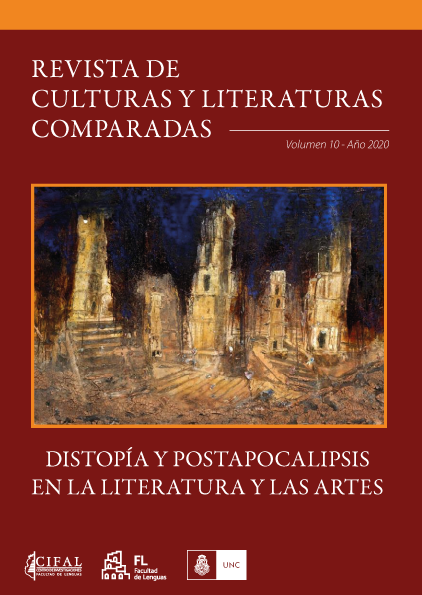Navigating Blind the Globalized Ruin : the Ustopian Vision of Josh Malerman's Bird Box (2014)
Keywords:
post-apocalyptic, dystopian, ustopian, schizophrenia, hyperrealityAbstract
This paper purports to read Josh Malerman’s novel Bird Box (2014) as a response to French philosopher Jean Baudrillard’s “ecstasy of communication,” or the metaphoric state of schizophrenia characteristic of postmodern societies, in which the cacophony of media messages and the proliferation of images permeate through human subjects as if they were transparent. The theoretical framework for this analysis is completed by the distinction between dystopia and post-apocalyptic tale established by Heather Hicks, for whom at the heart of dystopia lies “the oppressiveness of uniformity” linked to the presence of a single metanarrative (Hicks 8). By contrast, what characterizes the post-apocalyptic is the diametrically opposed socioscape “punctuated by small communities adhering to various micronarratives” (Hicks 8), in which there is no glimpse of a consensus for social exchange. The category of ustopia, a term coined by Margaret Atwood, complements and sheds light upon the concept of dystopia in a strict relationship with its counterpart utopia, in a conceptual amalgamation which is compatible with James Berger’s post-apocalyptic paradox: “a radically antihumanistic rhetoric [which] masks a radical and frustrated humanism” (9). This interpretation of the novel dissociates it from the popular genre of horror fiction and problematizes its meanings on the basis of the ambiguity of its ustopic vision.
Downloads
References
Atwood, Margaret. Margaret Atwood: the Road to Ustopia. The Guardian online. Web. 12 marzo 2020.
Baudrillard, Jean. Simulacra and Simulations. Jean Baudrillard, Selected Writings. Ed. Mark Poster. Stanford: Stanford University Press,
166-184.
---. The Ecstasy of Communication. Ed. Hal Foster. The anti-aesthetic. Essays on Postmodern Culture. Seattle: Bay Press, 1983. 126-134.
Berger, James. Representations of Post-Apocalypse. Minneapolis: University of Minnesota Press, 1999.
Hicks, Heather J. The Post-Apocalyptic Novel in the Twenty-First Century. Modernity Beyond Salvage. New York: Palgrave Macmillan, 2016.
Kellner, Douglas. Jean Baudrillard. Ed. Edward N. Zalta. The Stanford Encyclopedia of Philosophy Online. Web. 12 marzo 2020.
Malerman, Josh. Bird Box. United Kingdom: Harper Voyager, 2014.
Newland, Martin. Josh Malerman’s Bird Box presents a new take on unseen terror. The National. “Arts and Culture”. Web. 14 marzo 2020.
Poster, Mark, ed. Jean Baudrillard. Selected Writings. Stanford: Stanford University Press, 1988.
Published
How to Cite
Issue
Section
License

This work is licensed under a Creative Commons Attribution-NonCommercial-NoDerivatives 4.0 International License.
Aquellos/as autores/as que tengan publicaciones con esta revista, aceptan los términos siguientes:
a) Los/as autores/as conservarán sus derechos de autor y garantizarán a la revista el derecho de primera publicación de su obra, el cual estará simultáneamente sujeto a la Licencia de reconocimiento de Creative Commons.
b) La cesión de derechos no exclusivos implica que la publicación de los artículos en la presente revista no quita la posibilidad o el derecho al autor/a de publicar su obra de manera posterior en otras revistas u órganos editoriales y la autorización por parte de los/as autores/as para que el trabajo sea depositado en los repositorios institucionales, tales como el Portal de Revistas de la Universidad Nacional de Córdoba.



